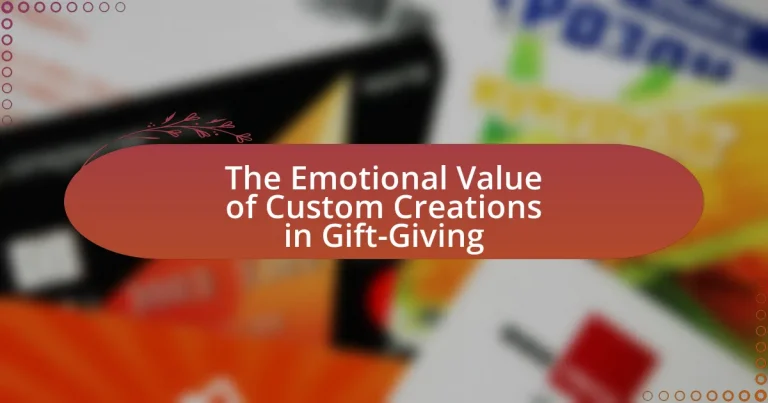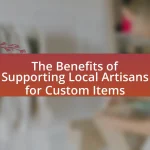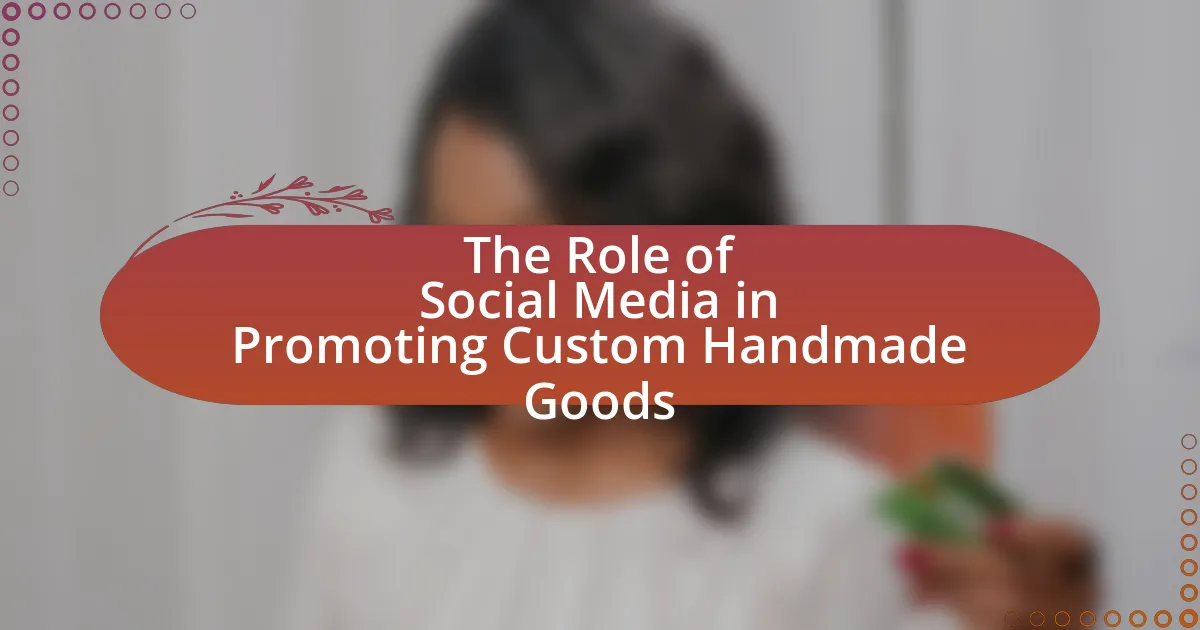The main entity of the article is the emotional value of custom creations in gift-giving. The article explores how personalized gifts enhance emotional connections between givers and recipients by reflecting thoughtfulness and understanding of individual preferences. It discusses the psychological impact of custom gifts, highlighting that they evoke stronger emotional responses compared to generic items, thereby fostering deeper relationships. Key elements contributing to the emotional value of custom gifts include personalization, uniqueness, and relevance to shared experiences. The article also outlines best practices for creating meaningful custom gifts, emphasizing the importance of understanding the recipient’s tastes and the significance of thoughtful presentation.
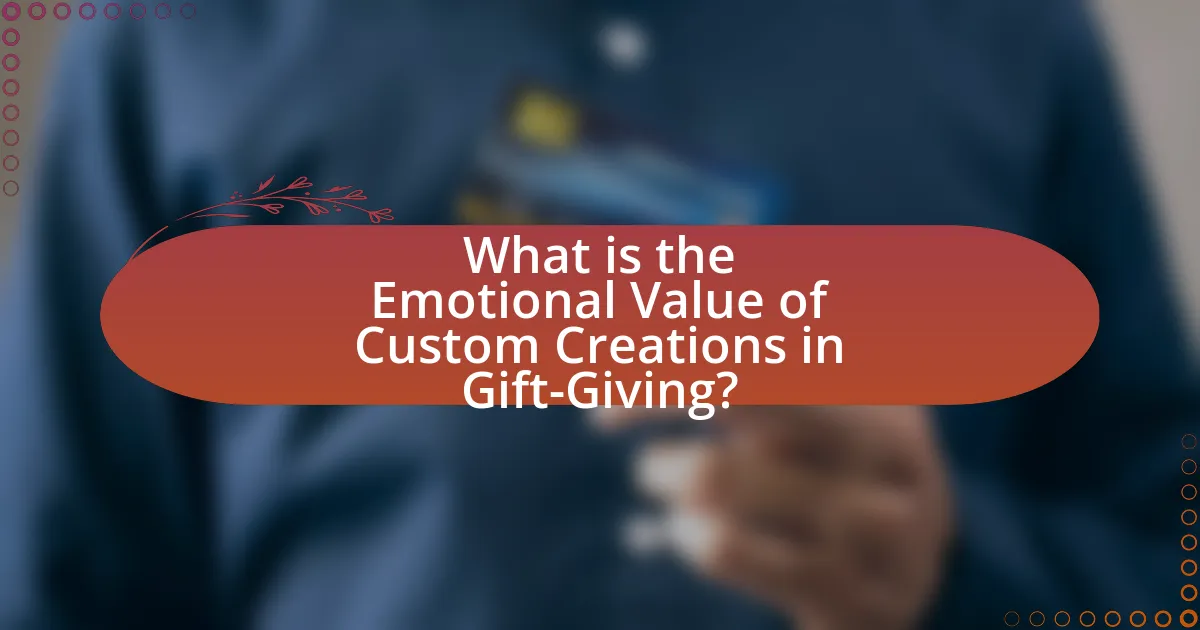
What is the Emotional Value of Custom Creations in Gift-Giving?
The emotional value of custom creations in gift-giving lies in their ability to convey thoughtfulness and personal connection. Custom gifts are tailored to the recipient’s preferences, which enhances the emotional impact and fosters a sense of appreciation. Research indicates that personalized gifts can evoke stronger emotional responses, as they reflect the giver’s effort and understanding of the recipient’s individuality. For instance, a study published in the Journal of Consumer Research found that personalized gifts are perceived as more meaningful and can strengthen interpersonal relationships. This emotional resonance is crucial in gift-giving, as it transforms a simple exchange into a memorable experience that reinforces bonds between individuals.
How do custom creations enhance the gift-giving experience?
Custom creations enhance the gift-giving experience by providing a personalized touch that resonates emotionally with the recipient. This personalization fosters a deeper connection, as gifts tailored to individual preferences or experiences demonstrate thoughtfulness and effort. Research indicates that personalized gifts are perceived as more meaningful, leading to increased emotional satisfaction for both the giver and the receiver. For instance, a study published in the Journal of Consumer Research found that consumers value personalized items significantly higher than generic ones, as they evoke stronger emotional responses and create lasting memories.
What emotions are typically associated with receiving custom gifts?
Receiving custom gifts typically evokes emotions such as joy, appreciation, and a sense of connection. These emotions arise because custom gifts are often perceived as thoughtful and personal, reflecting the giver’s understanding of the recipient’s preferences and personality. Research indicates that personalized gifts can enhance emotional responses; for instance, a study published in the Journal of Consumer Research found that recipients of personalized gifts reported higher levels of happiness and satisfaction compared to those receiving generic items. This emotional impact is further amplified by the uniqueness of custom gifts, which fosters a deeper bond between the giver and the recipient.
How do personalized gifts differ from generic ones in emotional impact?
Personalized gifts evoke a stronger emotional impact than generic ones due to their unique connection to the recipient’s identity and experiences. Research indicates that personalized gifts demonstrate thoughtfulness and effort, which enhances the emotional value associated with the gift. A study published in the Journal of Consumer Research found that gifts tailored to the recipient’s preferences lead to greater feelings of appreciation and emotional resonance, as they reflect a deeper understanding of the recipient’s personality and interests. This connection fosters a sense of belonging and significance, making personalized gifts more memorable and cherished compared to generic alternatives.
Why is emotional value important in gift-giving?
Emotional value is important in gift-giving because it enhances the significance of the gift, fostering deeper connections between the giver and the recipient. Gifts that carry emotional value often reflect personal sentiments, shared experiences, or meaningful relationships, making them more memorable and impactful. Research indicates that gifts with emotional significance can strengthen social bonds and improve interpersonal relationships, as they convey thoughtfulness and care. For instance, a study published in the Journal of Consumer Research found that gifts perceived as thoughtful lead to greater relationship satisfaction, highlighting the role of emotional value in enhancing the overall gift-giving experience.
What role does emotional value play in strengthening relationships?
Emotional value significantly enhances the strength of relationships by fostering deeper connections and mutual understanding. When individuals express emotions through gifts, particularly custom creations, they convey thoughtfulness and personal significance, which can lead to increased feelings of appreciation and love. Research indicates that personalized gifts evoke stronger emotional responses, as they reflect the giver’s understanding of the recipient’s preferences and values. This emotional resonance not only reinforces existing bonds but also encourages open communication and trust, essential components for long-lasting relationships.
How can emotional value influence the recipient’s perception of the giver?
Emotional value significantly influences the recipient’s perception of the giver by enhancing the perceived thoughtfulness and intention behind the gift. When a gift carries emotional significance, such as personal memories or shared experiences, it fosters a deeper connection between the giver and the recipient. Research indicates that gifts with emotional value are often viewed as more meaningful, leading to increased appreciation and positive feelings towards the giver. For instance, a study published in the Journal of Consumer Research found that gifts perceived as thoughtful, which often include emotional elements, result in stronger relational bonds and higher satisfaction for both parties involved.
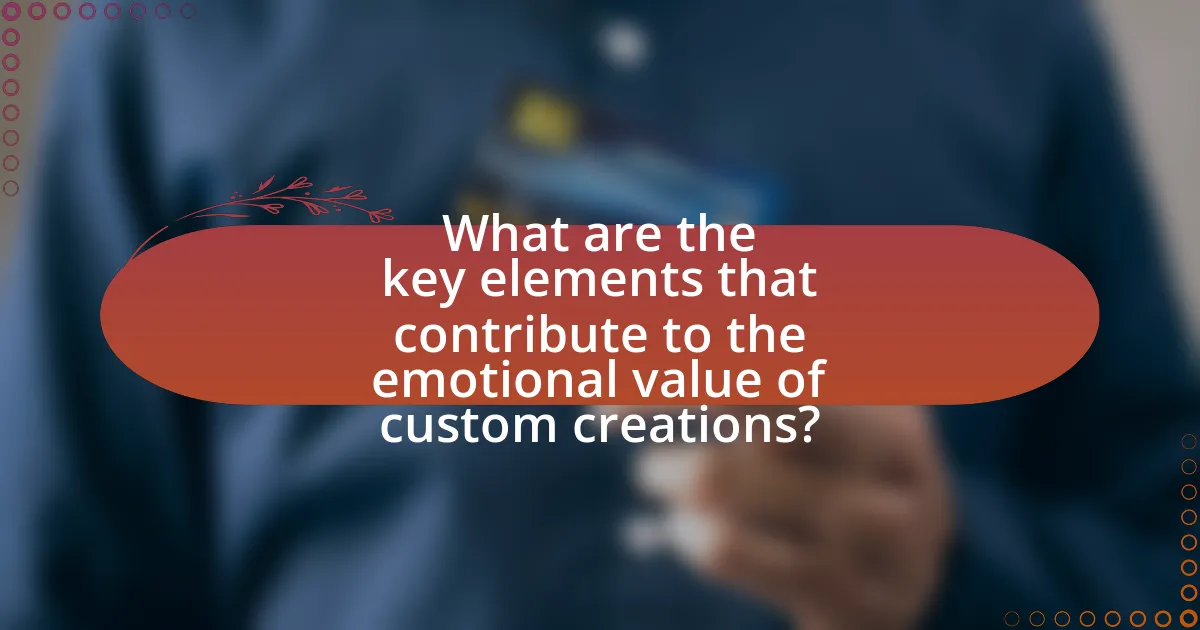
What are the key elements that contribute to the emotional value of custom creations?
The key elements that contribute to the emotional value of custom creations include personalization, uniqueness, and the connection to the recipient. Personalization allows the creator to tailor the item specifically to the recipient’s preferences, enhancing emotional resonance. Uniqueness ensures that the creation stands out, making it memorable and special, which fosters a deeper emotional attachment. Additionally, the connection to the recipient, often rooted in shared experiences or sentiments, amplifies the emotional significance of the gift. Research indicates that personalized gifts are perceived as more thoughtful and meaningful, leading to stronger emotional responses from recipients.
How does personalization affect the emotional connection of a gift?
Personalization significantly enhances the emotional connection of a gift by making it unique and tailored to the recipient’s preferences. When a gift is personalized, it demonstrates thoughtfulness and effort, which fosters a deeper emotional bond between the giver and the receiver. Research indicates that personalized gifts are perceived as more meaningful, as they reflect an understanding of the recipient’s identity and interests. For example, a study published in the Journal of Consumer Research found that gifts that align with the recipient’s self-concept lead to greater emotional satisfaction and appreciation. This connection is rooted in the psychological principle that personalized items evoke feelings of being valued and understood, thereby strengthening interpersonal relationships.
What types of personalization can enhance emotional value?
Personalization types that enhance emotional value include customization, storytelling, and relevance. Customization allows individuals to tailor gifts to the recipient’s preferences, making the gift feel unique and special. Storytelling connects the gift to shared experiences or memories, deepening the emotional significance. Relevance ensures that the gift aligns with the recipient’s current life situation or interests, fostering a sense of understanding and care. Research indicates that personalized gifts are perceived as more thoughtful, leading to stronger emotional connections (Dunn & Norton, 2013, “Happy Money: The Science of Happier Spending”).
How does the thought process behind a custom gift impact its emotional significance?
The thought process behind a custom gift significantly enhances its emotional significance by demonstrating intentionality and personal connection. When a giver invests time and effort into selecting or creating a gift tailored to the recipient’s preferences, it conveys a deep understanding of their personality and interests. Research indicates that personalized gifts evoke stronger emotional responses, as they are perceived as more thoughtful and meaningful compared to generic items. For instance, a study published in the Journal of Consumer Research found that gifts perceived as personalized lead to greater feelings of appreciation and emotional attachment, reinforcing the bond between the giver and the recipient. This connection is further amplified when the custom gift reflects shared experiences or inside jokes, making it a tangible representation of the relationship.
What role does creativity play in custom gift creation?
Creativity is essential in custom gift creation as it allows for the personalization and uniqueness of gifts, enhancing their emotional value. When individuals apply creativity, they can tailor gifts to reflect the recipient’s personality, interests, and experiences, making the gift more meaningful. Research indicates that personalized gifts evoke stronger emotional responses, as they demonstrate thoughtfulness and effort, which are key components in gift-giving psychology. For instance, a study published in the Journal of Consumer Research found that personalized gifts are perceived as more valuable and are associated with greater emotional satisfaction for both the giver and the receiver.
How can unique designs evoke stronger emotional responses?
Unique designs evoke stronger emotional responses by creating a sense of individuality and personal connection. When a design is distinct, it resonates with the recipient’s identity and experiences, fostering deeper emotional engagement. Research indicates that personalized items can enhance feelings of attachment and significance; for instance, a study published in the Journal of Consumer Research found that consumers are willing to pay more for customized products because they perceive them as more meaningful. This connection is amplified when the design reflects shared memories or values, making the gift not just an object but a symbol of the relationship between the giver and receiver.
What are some examples of creative custom gifts that have high emotional value?
Creative custom gifts that have high emotional value include personalized photo albums, custom-made jewelry, and bespoke artwork. Personalized photo albums allow individuals to curate memories in a unique way, often leading to nostalgia and emotional connections. Custom-made jewelry, such as engraved pieces, can symbolize significant relationships or milestones, enhancing their sentimental worth. Bespoke artwork, tailored to reflect personal stories or shared experiences, serves as a lasting reminder of cherished moments. These gifts resonate deeply because they reflect thoughtfulness and effort, making them more meaningful than generic items.
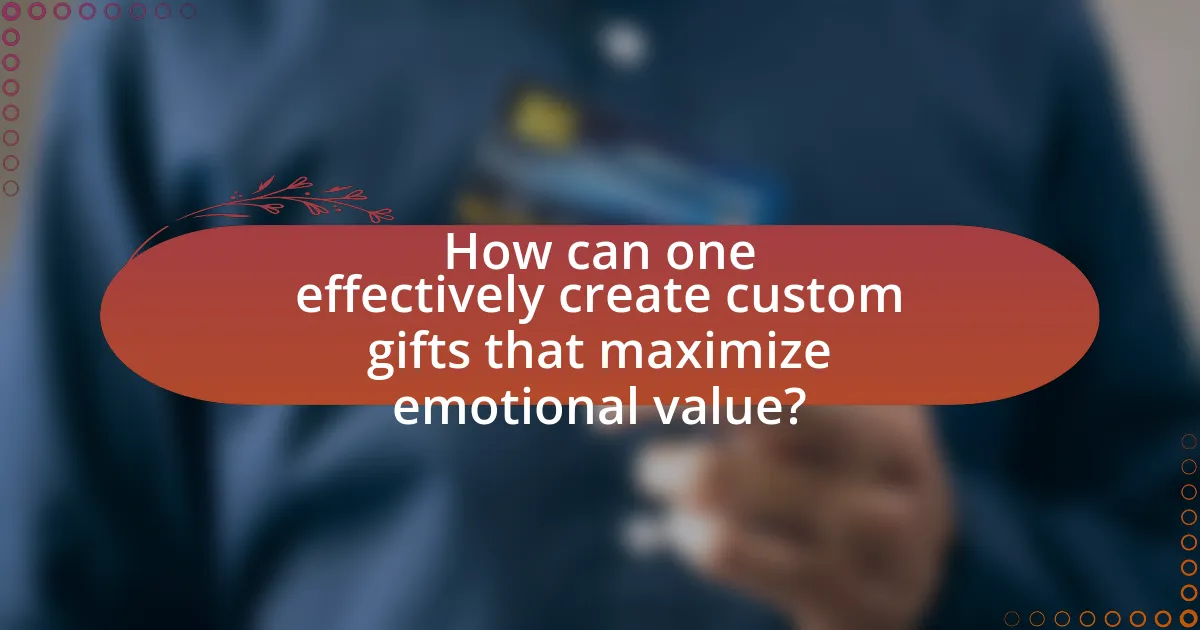
How can one effectively create custom gifts that maximize emotional value?
To effectively create custom gifts that maximize emotional value, one should focus on personalization, relevance, and meaningful experiences. Personalization involves tailoring the gift to the recipient’s preferences, interests, and memories, which enhances emotional connection. For example, a study by the Journal of Consumer Research indicates that personalized gifts are perceived as more thoughtful and valuable, leading to stronger emotional responses. Relevance ensures that the gift aligns with significant moments or shared experiences, such as anniversaries or milestones, which can evoke nostalgia and deepen emotional ties. Additionally, incorporating elements that reflect the recipient’s personality or shared experiences can further enhance the emotional impact of the gift.
What are the best practices for selecting a custom gift?
The best practices for selecting a custom gift include understanding the recipient’s preferences, personalizing the gift to reflect their interests, and ensuring the quality of the item. Knowing the recipient’s likes and dislikes allows for a more meaningful selection, while personalization, such as adding their name or a special date, enhances emotional value. High-quality materials and craftsmanship ensure that the gift is not only unique but also durable, making it a cherished item. Research indicates that personalized gifts can strengthen relationships, as they show thoughtfulness and consideration for the recipient’s individuality.
How can understanding the recipient’s preferences enhance the gift’s emotional impact?
Understanding the recipient’s preferences significantly enhances the emotional impact of a gift by ensuring that the gift resonates personally with them. When a gift aligns with an individual’s tastes, interests, or needs, it demonstrates thoughtfulness and consideration, which can evoke stronger emotional responses. Research indicates that personalized gifts can lead to increased feelings of appreciation and connection, as they reflect an understanding of the recipient’s identity and values. For instance, a study published in the Journal of Consumer Research found that gifts tailored to the recipient’s preferences are perceived as more meaningful, leading to greater satisfaction and emotional fulfillment. This connection between personalization and emotional impact underscores the importance of knowing the recipient’s likes and dislikes in the gift-giving process.
What factors should be considered when designing a custom gift?
When designing a custom gift, factors such as the recipient’s preferences, the occasion, personalization options, and budget should be considered. Understanding the recipient’s likes and interests ensures the gift resonates emotionally, while the occasion dictates the appropriateness of the gift type. Personalization options, such as custom messages or unique designs, enhance the emotional connection, making the gift more memorable. Lastly, the budget influences the materials and complexity of the design, ensuring the gift remains feasible while still being meaningful.
What common mistakes should be avoided in custom gift creation?
Common mistakes to avoid in custom gift creation include neglecting the recipient’s preferences, overlooking the significance of personalization, and failing to consider the occasion. Neglecting the recipient’s preferences can lead to gifts that do not resonate, as studies show that personalized gifts are more appreciated and valued. Overlooking personalization diminishes the emotional impact, as gifts that reflect the recipient’s personality or interests enhance emotional connections. Lastly, failing to consider the occasion may result in inappropriate gifts, which can undermine the intended sentiment.
How can misjudging the recipient’s taste diminish emotional value?
Misjudging the recipient’s taste can significantly diminish the emotional value of a gift by leading to a disconnect between the giver’s intentions and the recipient’s preferences. When a gift does not align with what the recipient values or enjoys, it can evoke feelings of disappointment or indifference rather than joy and appreciation. Research indicates that personalized gifts, which reflect the recipient’s interests, enhance emotional connections; thus, failing to consider these preferences can result in a lack of meaningful engagement with the gift. For example, a study published in the Journal of Consumer Research found that gifts perceived as thoughtful and tailored to the recipient’s taste are more likely to be cherished, reinforcing the idea that alignment with personal taste is crucial for maximizing emotional impact.
What are the pitfalls of overcomplicating a custom gift design?
Overcomplicating a custom gift design can lead to confusion and diminished emotional impact. When designs become overly intricate, the intended message or sentiment may be lost, making it difficult for the recipient to appreciate the thought behind the gift. Additionally, complex designs can increase production time and costs, potentially leading to delays that detract from the gifting experience. Research indicates that simplicity often enhances emotional connection; for instance, a study published in the Journal of Consumer Research found that simpler designs are more likely to evoke positive emotional responses. Therefore, maintaining clarity and focus in custom gift design is crucial for maximizing its emotional value.
What tips can help ensure a successful custom gift experience?
To ensure a successful custom gift experience, focus on personalization, quality, and thoughtful presentation. Personalization involves selecting items that reflect the recipient’s interests or preferences, which enhances emotional connection. Quality is crucial; using high-quality materials or craftsmanship ensures the gift is valued and appreciated. Thoughtful presentation, such as unique wrapping or including a heartfelt note, adds an extra layer of care that can significantly impact the recipient’s experience. Research indicates that personalized gifts can increase emotional satisfaction, making the recipient feel special and valued.
